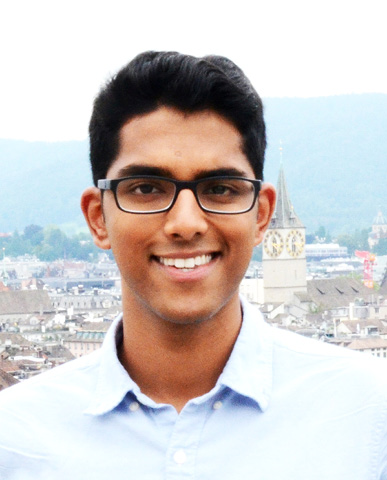Meet Gokul, SSRF Student from Canada
24.10.2019 | Katharina Emry
Gokul Dharan came to us from the University of Toronto (Canada). He spent his Student Summer Research Fellowship (SSRF) in the team of Prof. Stelian Coros, where he compared two methods for trajectory optimisation.

Gokul, what was the goal of your research project?
The goal of my research project was to develop a framework to compare different methods for trajectory optimisation. An example for a trajectory could be a robot navigating from point A to point B. The optimisation of trajectories is a class of problems where we have to find a trajectory that maximises some performance criteria while being subject to some constraints. So, the performance criteria for a robot could be to move from point A to point B as quickly as possible – with the constraint of not hitting the still object C that lies on the direct line between A and B.
Over the years, several methods to solve trajectory optimisation problem have emerged. In my project, I apply two of them, Newton’s method and Differential Dynamic Programming (DDP), to a single problem to compare their performance. The overall performance is the combination of two main factors: quality of the solution (how optimal is the solution?) and calculation speed (how long did it take to come up with the solution?).
Why is in-depth knowledge of trajectory optimisation methods important?
Optimisation control methods are used in a wide variety of cutting-edge technologies and research areas, including robotic manipulators and quadcopters. Gaining clarity into the different optimization methods and their relative performance allows us to deliver the most powerful tools for these problems.
What was the main research problem you had to solve?
Comparing optimisation control methods is not easy. They approach an optimisation in different ways and use entirely different parameters. My challenge was to develop one single framework in which two different methods can be used and compared.
«I had the opportunity to befriend like-minded people from all over the globe.»Gokul Dharan, SSRF Student from Canada
How did you tackle your challenge?
To have that single framework, I developed virtual testing scenario in a Matlab system. In that scenario I had two cars attempt to self-park on a 2D plane. They have an initial configuration and a target configuration. The optimal control methods are used to find the best way to reach the target configuration subject to some constraints like limits on acceleration and wheel angle as well as avoiding other cars. The rate of convergence and optimality of the trajectory found by each of the control methods can then be compared directly.
Did you enjoy working in research? Could you imagine pursuing it as a career?
I really enjoyed working in research. I’m still not sure whether I will become a researcher after graduation. However, I do know that I want to be involved in research in some capacity whatever career path I follow.
Which three things did you like most about your two summer months at ETH?
My peers were a major highlight of the fellowship. I had the opportunity to befriend like-minded people from all over the globe, which was a truly valuable experience. Other than that, travelling within and outside of Switzerland was fantastic. Last but not least, I enjoyed working in research and I learned a lot about a field that was completely new to me at the start of my fellowship.